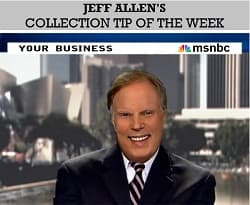Editor’s Note: Every Monday Jeff Allen offers you a tip about what you should do to ensure you never miss out — or get beat out — of your well-earned fee.
What Client Says:
We don’t pay fees.
How Client Pays:
Sometimes it’s for “certain positions,” sometimes it’s not. Sometimes it’s “company policy,” sometimes it’s personal preference. Sometimes it’s in writing, sometimes it’s not. Sometimes it’s a low fee ceiling, sometimes it’s a no-fee floor.
But always, any such notice must be communicated in advance. That means prior to the referral.
How can you be bound by a policy you don’t know? A sign that wasn’t there? This is called the objective theory of contracts. What would a reasonable recruiter in your position think if the fee was “cleared” (whatever that means)? The client’s undisclosed intent is irrelevant.
You must be prepared to show when and how you cleared that fee. You must be able to rap nonstop for 10 minutes about it, and back up your words with business records written at or near the time.
Anything showing receipt of the fee schedule is good. Anything showing acceptance of it is great.
These things meet your burden of proof as the plaintiff. Then the burden shifts to the client as the defendant. Can it prove that a written, rigid, no-fee policy has been communicated?
Of course not! That means a full five-figure fee — forthwith!
Sometimes it’s for “certain positions,” sometimes it’s not. Sometimes it’s “company policy,” sometimes it’s personal preference. Sometimes it’s in writing, sometimes it’s not. Sometimes it’s a low fee ceiling, sometimes it’s a no-fee floor.
But always, any such notice must be communicated in advance. That means prior to the referral.
How can you be bound by a policy you don’t know? A sign that wasn’t there? This is called the objective theory of contracts. What would a reasonable recruiter in your position think if the fee was “cleared” (whatever that means)? The client’s undisclosed intent is irrelevant.
You must be prepared to show when and how you cleared that fee. You must be able to rap nonstop for 10 minutes about it, and back up your words with business records written at or near the time.
Anything showing receipt of the fee schedule is good. Anything showing acceptance of it is great.
These things meet your burden of proof as the plaintiff. Then the burden shifts to the client as the defendant. Can it prove that a written, rigid, no-fee policy has been communicated?
Of course not! That means a full five-figure fee – forthwith!
